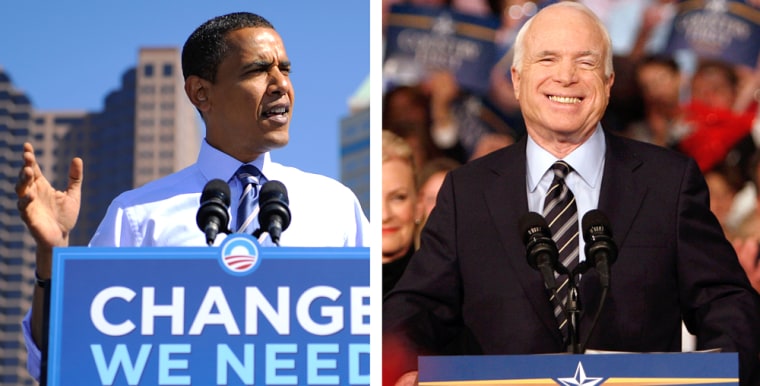John McCain and Barack Obama outlined modest steps to counter the faltering economy and plummeting stock market on Friday, fresh evidence of the dominant role of pocketbook issues in their race for the White House.
McCain, lagging in the polls, called for legislation that suspends for one year the requirement that investors age 70 1/2 begin to liquidate their retirement accounts. "To spare investors from being forced to sell their stocks at just the time when the market is hurting the most, these rules should be suspended," the Republican presidential candidate said in a speech in LaCrosse, Wis.
It was the Republican's second proposal in three days to deal with economic woes, following his call for the government to buy bad home-loan mortgages and renegotiate them at a reduced price.
Obama, who was campaigning in Chillicothe, Ohio, said he favors a temporary extension in an expiring tax break to let small businesses write off the cost of many new investments immediately, rather than over several years. He said he was making the proposal "because it's time to protect the jobs we have and to create the jobs of tomorrow by unlocking the drive, and ingenuity, and innovation of the American people."
The proposal would cover investments up to $250,000. Campaign officials put the cost to the Treasury at $900 million.
Obama: Extend SBA loans
Aides said Obama also wants to extend the Small Business Administration's disaster loan program to help small businesses that cannot access other sources of capital, as well as eliminate fees on SBA loan guarantees and increase the size of loans that could be covered. They put the cost at $5 billion.
The presidential rivals outlined their proposals as retirement accounts continued to lose value and businesses struggled to obtain loans necessary to operate or expand.
Recent polling indicates Obama has surged to a lead in the campaign in the three weeks since the simmering credit crisis boiled over, and McCain has struggled to regain his footing. Surveys also show voters make the economy their top issue.
Obama's tax write-off proposal was part of a Democratic-backed economic stimulus package that failed to clear Congress before lawmakers adjourned for the elections.
In his speech, Obama said the $700 billion bailout that Congress passed last week for the financial industry was "only the beginning" of what is needed.
"Now we need to pass a rescue plan for the middle-class that will provide every family immediate relief to cope with rising food and gas prices, save one million jobs by rebuilding our schools and roads, and help states and cities avoid budget cuts and tax increases," he said.
"And we should extend expiring unemployment benefits to those Americans who've lost their jobs and can't find new ones."
The blocked stimulus legislation included the items Obama mentioned, and the Democratic presidential candidate said McCain "has said nothing" about enacting them.
McCain's campaign did not immediately provide an estimate of the number of investors who would be helped by his proposal to block the mandatory sale of retirement account assets.
Current law requires individuals to begin liquidating a portion of their retirement account savings on April 1 of the year following their 70th birthday or their retirement, whichever comes later.
McCain wants mortgage buy-back
In Tuesday night's debate, the Republican called for the government to buy up bad home-loan mortgages and renegotiate at the new reduced value of the properties, a step designed to help homeowners facing foreclosure.
"The United States government will support the refinancing of distressed mortgages for homeowners and replace them with manageable mortgages," he said in his speech in Wisconsin. "These funds aren't new, but the priorities will be when we put the financial strength of our government back on the side of working families."
McCain has put the cost of the plan at $300 billion, and initially said it would come from the $700 billion bailout.
On Thursday, he said additional funds might be needed, but his speech in LaCrosse appeared to rule that out.
Initially, Obama's aides said he had favored the same approach before even McCain outlined it.
But since then the McCain campaign altered the description of his plan to make clear he wants to pay financial institutions the full face value of troubled mortgages on homes that are no longer worth that much. After that clarification, Obama has criticized McCain's plan as a bail out of the banks and mortgage companies that made the risky loans that helped create the current crisis. Obama says the lenders must assume some of the losses from their bad loans.
McCain's mortgage proposal has also drawn a lukewarm reception from Republicans, some of whom have declined to endorse it, and vehement criticism from some conservative commentators, including the National Review, which called it "a gift to lenders who abandoned any sense of prudence during the boom years."
